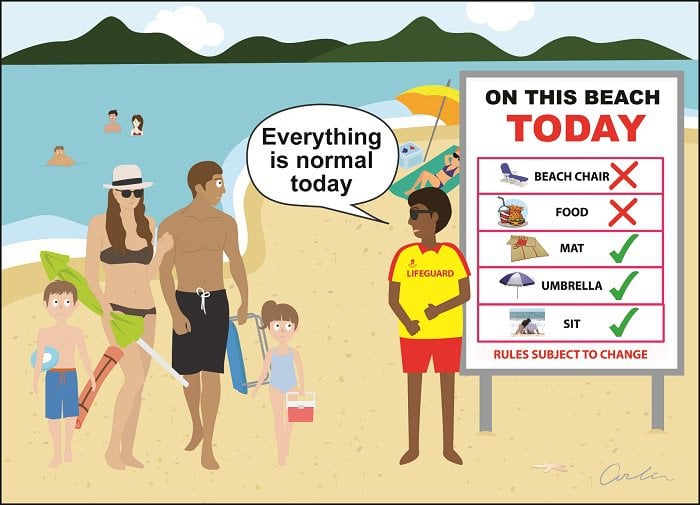Opinion: Beach bums blue after latest Phuket ban

PHUKET: Patong Mayor Chalermluck Kebsup is correct in calling for a compromising approach to the ban on beach chairs on the island (story here). An equitable and transparent solution must be worked out before this latest embarrassment causes irreparable damage to the island’s tourism industry, permanently driving away many of the island’s most loyal guests.
Images of elderly tourists being forced by police to remove beach chairs from the sand is the worst possible publicity for the island. This is especially true now, as it comes just months after images were seen around the world of the military personnel patrolling the sands with automatic assault rifles during the applauded cleanup campaign.
It is sad that our leaders so consistently fail to demonstrate sufficient foresight to prevent or mitigate impending problems.
In this space we have warned in advance about several disasters-in-waiting, including the inevitable collapse of the Patong Hill road due to downslope construction work, the SuperCheap inferno and the rapid break-up of the Coral Reef Squadron artificial reef after exposure to monsoon-season currents.
The Gazette is not blowing its horn or claiming special powers of prognostication: we are simply pointing out things that should be obvious to all. The ongoing beach chair fiasco is no different.
An editorial published at the start of this high-season read: For better or worse, Phuket evolved as a beach tourism destination with beach loungers and parasols as an integral part of the infrastructure. That corrupt local politicians used them to illegally amass personal fortunes over the years does not negate that reality.
That editorial went on to call for temporary measures to allow for sun loungers and parasols to be made available to tourists during the current high season, with a long-term, sustainable and transparent approach to be drawn up during the upcoming low season.
Instead, we have witnessed a series of highly-confusing directives and flip-flops, with enforcement of the controversial “no beach chair” rule varying greatly in different areas. In a final bid to end all the confusion, a complete ban on all beach chairs across the island was eventually imposed.
Not only is this ban harmful to the tourism industry, but it will no doubt prove to be unenforceable by police in the long term.
Looking further into the future, it is easier to imagine a scenario in which police replace local administrative bodies in reaping the profits from rented beach chairs, parasols and jet-skis than it is to imagine comprehensive enforcement of the ban.
Rather than ban beach chairs completely, a system could easily be devised in which tourists could simply “register” beach chairs into a central database and receive a sticker or some other form of certification that it is owed by them, not rented.
This of course seems like a cumbersome and overly bureaucratic approach to something as simple as enjoying a day at the beach, but for diehard beach bums it might be worth a try.
Latest Thailand News
Follow The Thaiger on Google News:


























